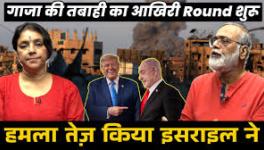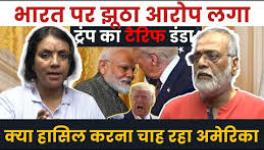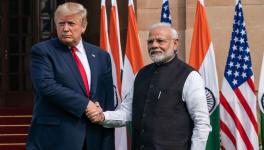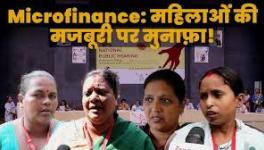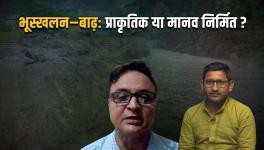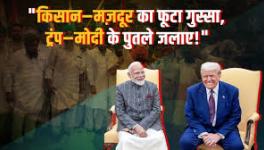Why Ban on Awami League is a Concern for India & Subcontinent
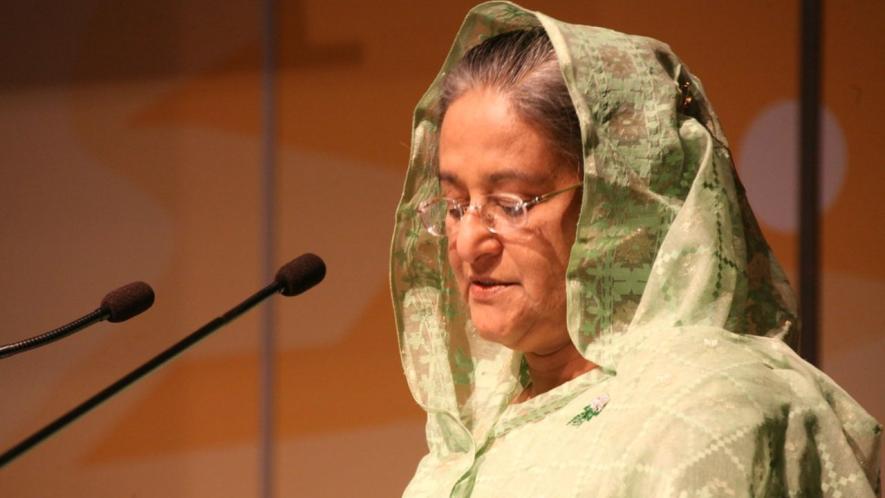
Image Courtesy: Flickr
Since August 5 last year, the activities of the Awami League in Bangladesh have been virtually banned. The official announcement on May 10, this year, declaring the ban on political activities of Sheikh Hasina’s party was merely a formality.
The real blow is feared in the coming days, when Sheikh Hasina may be convicted in a staged trial by Dhaka’s International Crimes Tribunal and the ban on her party could also be officially declared. For this very purpose, the interim government has amended the law to empower the tribunal, enabling it to declare any political party illegal. On the basis of government notification, Bangladesh Election Commission has de-registered the 76-year-old Awami League, the country’s oldest political parties of the sub-continent.
Mohammad Yunus’s government has taken this step in the context of a mass movement led by the newly formed political platform by his loyalists—the National Citizens’ Party (NCP). Although the NCP was at the forefront of the movement, radical fundamentalist and militant groups—including Jamaat-e-Islami, the banned organisation Hizb-ut-Tahrir and others have joined rallies demanding a ban on Awami League, which was co-founded by Sheikh Mujibur Rahman, the ‘Father of the Nation’ of Bangladesh.
Notably, Jamaat is a declared opponent of the Liberation War and the ideological progenitor of Pakistan’s infamous groups—Razakar, Al-Badr, and Al-Shams. Fifty-four years after the 1971 Liberation War, in 2025, the main pro-liberation political force who led the independence movement, is once again being banned under pressure from anti-liberation forces. No doubt, all this is the result of an understanding between the interim government and the protestors.
Rather, the timing is significant. The proscription of Hasina’s party’s operations came at a time when the Indian Army was pounding Pakistan in the north-western border, much like it did in the 1971 war, including on the soil of then East Pakistan. As the same defeated force of 54 years ago was being crushed once again by India, the ban on the main organiser of the Liberation War and the victorious side, the Awami League, was seen as a message of friendship and solidarity with Pakistan Army and the government, from Mohammad Yunus, Chief Advisor of Bangladesh, as if he was Yahya Khan—the Pakistani military ruler defeated in the Liberation War, rising from his grave.
On March 26, 1971, Yahya Khan had banned the Awami League without trial, branding Mujibur Rahman a traitor and his party a threat to national security and sovereignty. The language of the May 10, 2025, notification is almost identical. Hasina’s party has now been labelled a danger to the nation’s sovereignty and public security.
The events that followed the ban in 1971 are written in golden letters—under the leadership of the then banned Awami League, Pakistan was dismembered and a new and sovereign Bangladesh born through the Liberation War. Fifty-four years later, it seems Yunus is taking revenge on behalf of the late Yahya Khan, seeking to diminish the victorious force of the Liberation War. There is no doubt, the Awami League is again facing a major crisis.
However, in politics, such crises often bring unforeseen opportunities. In the case of Hasina's party this has been proven true at least seven times. In 1958, during General Ayub Khan’s regime, the Awami League was banned along with all other political parties. The party was only 10 years old then, and frontline leaders like Huseyn Shaheed Suhrawardy and Sheikh Mujibur Rahman were sent to jail.
Read Also: Bangladesh is Walking Against its Own Existence
Banning political parties was a phenomenon since the birth of Pakistan. Like, in India, communist and Left forces were the initial targets in the newly formed nation. In 1954, the Communist Party of Pakistan (CPP) was banned by the Liaquat Ali Khan government on the charge of planning a military coup led by Major General Akbar Khan. CPP was formed in Calcutta, India, by Marxist intellectual Sajjad Zaheer. In the same year, CPP’s students wing, the Democratic Students Federation (DSF), was also banned.
Interestingly, in 1954, the first provincial general election in East Pakistan Provincial Assembly (known as East Bengal Legislative Assembly from 1947 to 1955) was held. The Left forces rallied behind the United Front, which formed the first elected government led by Awami Muslim League, later renamed as Awami League, to uphold its secular character, led by Mujibur Rahaman.
The National Awami Party (NAP), the first major Left political group led by Abdul Hamid Khan Bhashani of united Pakistan, faced a ban in 1975.
The dominant practice of banning political parties continues in both the parts of the then Pakistan; Imran Khan’s party, Pakistan Tehreek-e-Insaf, was facing the threat of ban in recent times.
Though the 1958 ban was lifted, political activities throughout the 1960s were severely restricted. Yet, amid that suffocating atmosphere, the Awami League grew the most and Mujibur Rahman emerged as the soul of the liberation-aspirant people of East Pakistan. His six-point demands became the charter of freedom for Bengalis on the other side of the border, transforming the autonomy struggle into a fight for independence. The first general election of the Pakistan National Assembly held in 1970 was actually a referendum in favour of independence for East Pakistan.
In independent Bangladesh, the Awami League faced its greatest crisis on August 15, 1975, when Mujibur Rahman was assassinated along with his family. Backed by the then unelected rulers, Bangladesh began its drift toward a Pakistan-like trajectory—contrary to the ideals of the Liberation War, public expectation and the Awami League’s politics.
Naturally, the Awami League, left leaderless and fragmented, faced an existential crisis. The government ruled by Ziaur Rahaman imposed stiff restrictions on political activities and it was forbidden to pronounce the enlivening phrase ‘Joy Bangla’ during the Liberation War. Hussain Muhammad Ershad, the second military ruler of Bangladesh, followed the same path. Both the Generals founded their own parties. Bangladesh Nationalist Party of Rahman and Jatiyo Party of Ershad became the new and strong opponents of Awami League and other pro-liberation forces.
The dark clouds began to clear on May 17, 1981, when Hasina, daughter of Mujibur Rahman, returned to the country at the risk of her life. Her return was fraught with danger at every step. Fast forward to August 5, 2024, the reverse occurred in her life—she had to leave the country. Looking back, it’s evident that despite unimaginable adversity, the Mujib-Hasina party has repeatedly bounced back and even in hostile conditions, its vote share has hovered around 30%.
Still, it must be remembered that the current situation is far more complex and critical than in post-1971 and 1975. Back then, the Awami League led the Bengalis fight for rights against West Pakistani rulers. That context compelled India to declare war on Pakistan and support the liberation of East Pakistan.
After 1975, Indira Gandhi, like the Liberation War days, continued to favour pro-liberation forces, gave shelter and protected Hasina. In contrast, the July-August 2024 staged uprising was against the 15-year rule of the Awami League led by Hasina.
Second, the party’s leadership is now entirely in exile and Hasina is considerably older now. These realities must shape her strategy for a comeback. A seasoned politician like her will surely not rely solely on India. At the same time, India cannot turn a blind eye to the present crisis.
The Awami League’s crisis is not just about Hasina or her party, it is far more about Bangladesh itself. For democratic, secular, progressive and patriotic people across the sub-continent, this crisis appears as a dark cloud of worry.
In Bangladesh, progressive forces, such as the Workers Party and the Jatiya Samajtantrik Dal may face the same fate, like a ban, in near future. Prominent leaders, such as Rashed Khan Menon of the Workers Party and Hasanul Haq Inu of the JSD, have sent to to jail without trial since august 2024. Bangladesh prisons are now packed more with pro-democracy people than with murderers, thieves, robbers and rapists. The interim government is suppressing any form of dissent using the police and military forces.
What’s astonishing is that radical communal forces and militants enjoy complete freedom. They are openly calling for the creation of a ‘new Bangladesh’, with the aim to establish an Islamic order.
What’s even more surprising is that the recommendations of the Reform Commission formed by the Yunus government are further empowering the fundamentalists. There have been proposals to remove the words ‘secularism’ and ‘socialism’ from the Constitution. A noticeable effort is underway to gradually diminish the importance of the Liberation War.
India officially expressed concern about the way the ban was imposed on Awami League and reiterated its position for conclusive election as soon as possible. It is time for secular, democratic, progressive forces of both political and civil society to also speak out against the undemocratic actions of the interim government in Bangladesh.
Kolkata’s astonishing silence is stunning. The city that protests around the world against the stifling of democracy, has remained strangely silent about the grand spectacle of burying democracy and secularism in a neighbouring country. We seem to have forgotten that the headquarters of the provisional government of independent Bangladesh during the Liberation War was in Kolkata. It was almost as if the Awami League was reborn in this city.
The allegations of democracy and human rights violations against Sheikh Hasina's government should be properly investigated. It is important that individuals are tried in accordance with the Criminal Code. But in a democracy, elections are the only legitimate means to punish a political party.
By taking the opposite path, banning the Awami League and de-registering it by the Bangladesh Election Commission, the consequences cannot be confined within the country’s border. There are people within the party who want severe action and legal punishment of those who might have committed crime and corruption. But banning the party means denial of rights of those who stood behind this political outfit for their stand on secularism, socialism and other egalitarian ideas. That a large section of people still supports Awami League is evident from the massive demonstration organised by its supporters against the imposition of ban.
The party’s past crises mostly stemmed from local pro- Pakistani feudal lords, those who had opposed independent Bangladesh. But there was no direct agenda to challenge India’s territorial integrity or sovereignty.
Today’s crisis contains two key elements.
First, by advancing radical Islamic forces, there is a plan to turn Bangladesh into a militant state, with the aim of destabilising eastern and northeastern India and challenging its integrity. Muscle flexing by communal forces in India is not unlikely either.
Since a government led by an extreme nationalist party like the Bharatiya Janata Party, representing the interests of the religious majority, is in power, there is doubt about how easily India will be able to handle the current situation.
For any party driven by narrow electoral gains and political self-interest, confronting religious fundamentalists and militant groups becomes a difficult task.
Second, behind these actions is the implementation of an American agenda that risks Bangladesh’s sovereignty too. Strangely, this resembles the alliance during the 1971 battlefield, where two anti-Awami League and anti-India powers, Pakistan and the United States, are once again walking hand-in-hand on Bangladeshi soil. Thus, 54 years after the Liberation War, Bangladesh, the Awami League, and India are facing a shared crisis.
The 15-year rule of Hasina, now labelled as misrule and a period of crimes against humanity, was also the time when she repeatedly opposed American aggression. She did not yield to US pressure to lease out St. Martin Island situated in the northeastern region of the Bay of Bengal close to the border between Bangladesh and Myanmar. She defied pressure from both America and China to preserve Bangladesh’s territorial integrity, which also ensured India’s security.
Moreover, economic progress of Bangladesh during Hasina’s regime was noteworthy. Several economic and social indices measured by internationally accepted standards rose to high positions, at times even surpassing that of India. Poverty alleviation and infrastructural development in this eastern neighbour, despite obstacles by several international agencies, including the World Bank, became a visible reality.
Hasina’s firm stand coupled with stringent action against the extremist and anti-India forces within Bangladesh cannot be forgotten by the people of India. The present dispensation led by Yunus went on the reverse gear and brought a nullity to the erstwhile measures against anti-India forces.
Now, the proposal at the UN to use Bangladesh’s land as a ‘Humanitarian Corridor’ for war-torn Myanmar is actually a part of US strategy. They want military dominance in areas like Chittagong and Cox’s Bazar, not just only to counter China, but to intimidate India as well.
This is why, despite the rise of Islamic extremism in Bangladesh, Donald Trump’s administration, while claiming to uproot terrorism, has remained silent.
Trump understands nothing but business. Nobel Peace Prize winner Yunus is, after all, a banker and businessman. He has pleased Trump’s close friend Elon Musk by giving his company Starlink a huge business in Bangladesh cyber space. By giving the Humanitarian Corridor, he is trying to further satisfy Trump and pave the way to retain power without election.
The Awami League was banned at a time when Hasina was raising strong objections against the corridor, accusing it of compromising the country’s sovereignty. There is no doubt, this decision by Dhaka is a diplomatic shock for New Delhi. The US ceasefire initiatives between India and Pakistan was also a calculative step toward its assertion of dominance in the region.
As mentioned in multiple articles earlier, it is quite natural for two nationalist leaders like Trump and Narendra Modi to have a personal understanding and a meeting of minds. But Trump has never truly been a friend of India. Perhaps, he is no one's friend—unless he can profit from doing business with them. It's not just that he targeted India by imposing export tariffs; the kind of remarks he made about our country regarding import-export policy were extremely insulting and an attack on our national sovereignty. He is aggressively trying to take over the Indian market. Hopefully, by now, Modi’s supporters have come to recognise this so-called American friend, those who used to see Trump’s re-election as a victory for Modi.
Trump’s return to the White House had a major impact on the political landscape of Bangladesh as well. A section of the Awami League leadership believed that once he stepped into the White House again, he would take significant action against Dhaka. Given how vocal he was during his campaign about incidents of minority oppression in Bangladesh—and the warnings he issued about how he would deal with the Yunus government if he was President—it might not have been unusual for people to have high expectations from him. However, this writer had personally told many political observers and Awami leaders that Trump was cut from a different cloth. For him, promises are like cigarette smoke—they vanish into thin air. Beyond securing business deals and military advantages, he doesn’t think about much else. If those two conditions are met, he might even recommend Yunus for another Nobel Prize in Economics.
Over the past 10 months of the Yunus regime in Bangladesh, the actions of the Trump administration have not been comforting for India either. The Trump administration has taken no hard stance. Even though the rise of Islamic extremism and efforts to turn Bangladesh into another Syria or Afghanistan are plainly visible, the US embassy in Dhaka has remained silent. In fact, it’s been a long time since anyone has been permanently appointed as the US ambassador to Dhaka.
During Hasina’s tenure, US officials had begun frequent travels between Washington and Dhaka and tried to interfere in government actions and policies. Now, such visits are only revealed after they’ve quietly left the country. And although one hears a lot about America’s global zero-tolerance policy on terrorism and extremism, its stance on Bangladesh is clearly different. Even statements by US intelligence chief Tulsi Gabbard regarding the persecution of minorities, were virtually dismissed by the Trump administration as her personal opinion.
Taking advantage of this favourable environment, the Yunus administration went so far as to ban the activities of the Awami League, one of the country’s oldest parties and a vanguard of the liberation war. This decision by Dhaka is undoubtedly a setback for New Delhi.
The writer is Executive Editor, The Wall, and former Senior Editor, Times of India. The views are personal.
Get the latest reports & analysis with people's perspective on Protests, movements & deep analytical videos, discussions of the current affairs in your Telegram app. Subscribe to NewsClick's Telegram channel & get Real-Time updates on stories, as they get published on our website.













